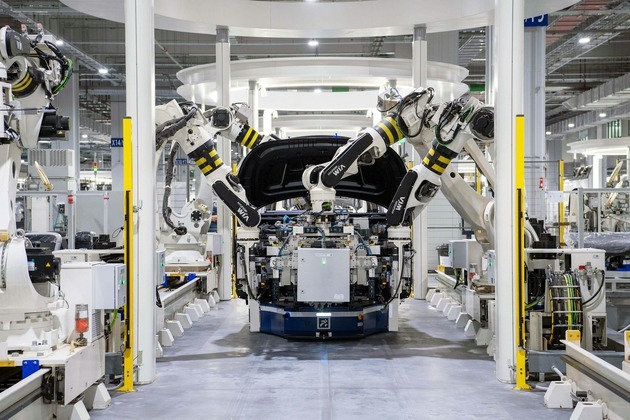The UK's small businesses should be fuelling the country's growth ambitions. Here's why that's not happening
The Conversation
12 Jun 2025, 16:27 GMT+10

The UK government's spending review has set out its priorities for the next three years. But behind the rhetoric about boosting growth lies growing concern about small businesses being locked out of the wider UK economy. Government funding and regulation are increasingly out of step with the reality of micro-enterprises and sole traders, shutting off their potential to boost GDP growth.
These businesses already punch above their weight, accounting for 60% of private-sector employment and more than half of total business turnover. Yet while recent budgets have pushed up costs through higher employer national insurance (NI) contributions and minimum wage rises, little meaningful relief has been offered in return.
As a result, a recent British Chambers of Commerce survey found that 82% of businesses expect the NI hike to damage their business. More than half say it will affect recruitment plans, prices and day-to-day operations.
Working with small businesses, apprentices and local enterprise leaders, we have seen how government support schemes often fail to reach those who need them most. Our research into informal work and legitimacy shows that many micro-businesses (ten employees or fewer) and sole traders operate in a space where regulatory demands feel misaligned with their economic reality.
Get your news from actual experts, straight to your inbox. Sign up to our daily newsletter to receive all The Conversation UK's latest coverage of news and research, from politics and business to the arts and sciences.
Across the UK, many micro-businesses already operate on a thin margin. For some, formal compliance with tax, labour and reporting obligations is simply out of reach. This is not due to unwillingness, but rather to a lack of manpower and time. In short, it is not about criminality, but survival.
And when formality becomes unviable, the government loses out too through reduced tax receipts, lower NI contributions and missed opportunities for growth.
In our research, we've found that formal and informal business owners don't reject regulation outright. They reject complex systems that demand compliance without offering security. When the risks of being "seen" by the taxman outweigh the benefits, informality becomes a rational, even morally justifiable, choice.
Informality is a significant global issue. According to the 2025 report by the International Labour Organization, even in high-income countries like the UK around one in ten workers are informally employed. And more than 60% of these people are working within formal enterprises, typically as undeclared workers.
Informal work is most common in service and construction industries, and despite high education levels, nearly one in four informal workers lives below the poverty line. This compares to just 14% of formal workers.
In the UK, regulatory structures can make matters worse. The VAT threshold, recently raised to Pound 90,000, may appear generous. But it can act as a cliff edge, discouraging small businesses from growing.
Evidence from the International Monetary Fund shows that firms often intentionally limit turnover to avoid registration. Compliance costs and administrative burdens create a clear disincentive to scaling up.
The slowdown is measurable. Small businesses reduce growth by up to 25% as they near the threshold, with no rebound in performance post-registration. This suggests a structural effect rather than temporary caution. Around one in five firms reports actively avoiding VAT registration by turning down work or restructuring operations. It's a clear sign that the system discourages formal expansion.
These structural barriers don't end with taxation. Even when support schemes are well designed and effective on paper, many small firms find themselves excluded by eligibility criteria or overwhelmed by the administrative requirements. For example, the Help to Grow: Management programme has delivered clear value, equipping thousands of SME (small and medium-sized enterprises) with vital skills in strategy, finance and innovation.
However, it is limited to businesses with five or more employees. This excludes sole traders, some micro-businesses and early-stage entrepreneurs, among others. These smaller firms, often operating informally or semi-formally, are arguably those most in need of accessible, flexible support. By overlooking them, even well-intentioned programmes risk reinforcing the gaps they aim to close.
Read more: How much for cash? Why the informal economy is bad for business, consumers and society
Apprenticeship policy highlights another example of unintended exclusion. While apprenticeships are promoted as a win-win for employers and learners, the funding rules and regulations are typically geared towards larger organisations.
For micro-businesses, the system often feels impenetrable. The administrative burden and cash-flow implications of taking someone away from their role to train them frequently outweigh the perceived benefits.
Adding to these challenges are the recent changes to Level 7 apprenticeship funding rules, in the form of age restrictions. This raises concerns about whether smaller employers will continue investing in leadership and skills development.
As a result, some of the smallest firms, particularly in personal services, trades, and early-stage startups, miss leadership development opportunities. This is not because they lack interest in training, but because the system was not designed with their scale or reality in mind.
If the government wants to support small businesses, it must move beyond one-size-fits-all tax tweaks and headline grants. It has signalled a commitment to fiscal efficiency and targeted growth. What's needed is a new model of support - one that recognises the complexity of informality, business growth and builds trust and opens routes into formal economic participation.
This means creating tailored support and offering incentives to grow and develop for sole traders, self-employed people, and micro-businesses rather than penalising them. The government must simplify support mechanisms and ensure they are genuinely accessible - particularly for time-poor micro-businesses.
It should move beyond rigid digital portals and offer relationship-based support through local networks, trusted intermediaries or one-to-one guidance. Crucially, access to skills programmes, including apprenticeships, should be guaranteed for businesses of all sizes, not just those large enough to navigate complex eligibility criteria or absorb upfront costs.
Without these measures, the UK will only deepen its two-tier economy - where formality becomes a privilege rather than a pathway. Building a fairer, more dynamic business environment starts by including those already doing the work, even if they are not yet on the books.
 Share
Share
 Tweet
Tweet
 Share
Share
 Flip
Flip
 Email
Email
Watch latest videos
Subscribe and Follow
Get a daily dose of Manufacturing Mirror news through our daily email, its complimentary and keeps you fully up to date with world and business news as well.
News RELEASES
Publish news of your business, community or sports group, personnel appointments, major event and more by submitting a news release to Manufacturing Mirror.
More InformationSmall Business
SectionReimagining Protein: Innovations That Could Prevent the Next Pandemic
Throughout human history, zoonotic diseases, illnesses that jump from animals to humans, have shaped civilizations, triggered pandemics,...
The UK's small businesses should be fuelling the country's growth ambitions. Here's why that's not happening
The UK government's spending review has set out its priorities for the next three years. But behind the rhetoric about boosting growth...
Robert Vadra misses ED appearance due to flu, says he's cooperating
New Delhi [India], June 12 (ANI): Advocate Suman Jyoti Khaitan, counsel for businessman Robert Vadra, on Tuesday addressed the media...
Spies and ties: The quiet war for Russias business elite
Patriotic business communities are gaining strength in Russia and attracting unwanted attention from abroad Behind velvet ropes and...
Interview: China's consumer shift offers growth path for Global South, says Rwandan economist
China has proven that you can build resilience through consumption, create jobs through value addition, and use trade policy to forge...
Waste pickers and vendors should be treated as workers, not small businesses - labour lawyer
A new report from the International Labour Organisation outlines a set of propositions on how countries should go about formalising...
Automotive
SectionBeijing approves rare earth shipments to top three US automakers
BEIJING/WASHINGTON, D.C.: In a rare move aimed at easing mounting supply chain pressure, China has issued temporary export licenses...
Tesla faces EV market pressure as May sales slide in Europe
AMSTERDAM, Netherlands: Tesla saw a sharp decline in sales across several major European markets in May, marking its fifth consecutive...
China bureaucrat bottlenecks over rare earths ripple through industry
BEIJING, China: A little-known office inside China's Ministry of Commerce has become a powerful chokepoint in the global auto and tech...
Mercedes prepares for supply breaks as China delays mineral supply
BERLIN/FRANKFURT: Some car parts factories in Europe have stopped production, and companies like Mercedes-Benz are making backup plans...
India Inc's corporate profits reach 17-year high in FY25: Motilal Oswal
New Delhi [India], June 13 (ANI): Corporate profits in India reached a significant milestone in FY25, with the profit-to-GDP ratio...
Saif Ali Khan, Kareena Kapoor Khan visit Karisma Kapoor's residence after Sunjay Kapur's death; offer condolences
Mumbai (Maharashtra) [India], June 13 (ANI): Bollywood stars Kareena Kapoor Khan and Saif Ali Khan reached Karisma Kapoor's residence...












